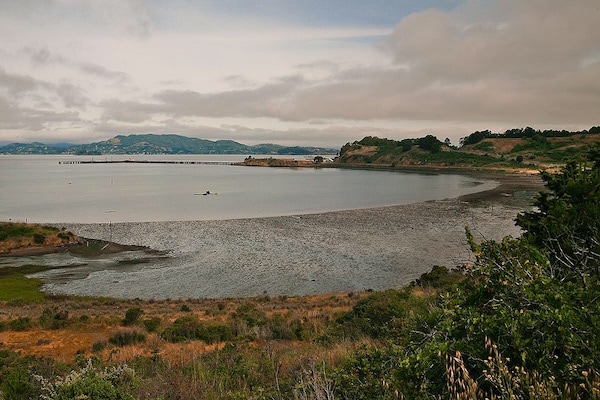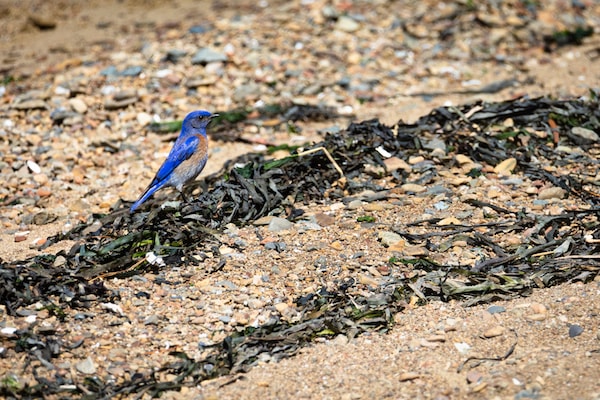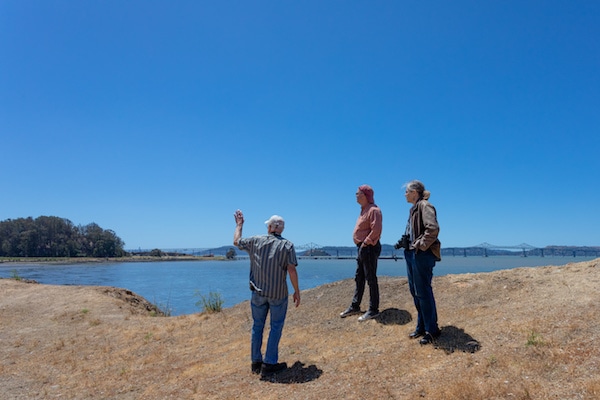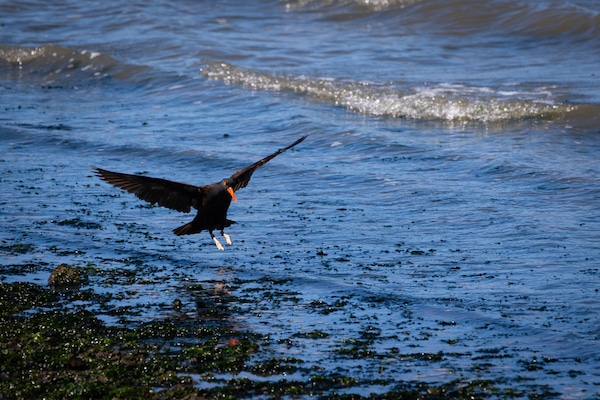Progress towards a Point Molate park
By Ilana DeBare
When a struggle to save a natural area from development has been going on for 25 years, every small step forward is more than welcome.
Golden Gate Bird Alliance and its allies in the fight to save Point Molate were heartened on March 18 when the Richmond City Council rejected a proposed bond issue for development there.
The council voted 4-0 (with three members absent) against a $292 million bond issue that would provide infrastructure for up to 2,000 luxury condos at Point Molate, one of the last undeveloped and unprotected areas along the San Francisco Bay shoreline.

Golden Gate Bird Alliance is part of a coalition of Richmond community groups, Native American groups, and environmental justice groups fighting the Point Molate project. The 413-acre site, north of the Richmond-San Rafael Bridge, is home to 600 plant and animal species—including over 140 bird species and four active Osprey nests—as well as Ohlone sacred sites and the Bay’s most pristine eelgrass bed.
Its stunning Bay views and wooded hillsides are a public treasure and should be preserved for public access as part of the East Bay Regional Park District, not privatized for luxury housing.
“We welcome this thoughtful decision by the Richmond City Council,” said GGBA Executive Director Glenn Phillips. “There’s still a long road ahead to preservation of Point Molate. But the council has acted responsibly in challenging a project that would be a disaster for wildlife, for public access to nature, and for the City of Richmond.”

The roots of the Point Molate development battle date back to the nationwide military base closures of the 1990s, when a naval fuel depot there was turned over to the City of Richmond. (The San Francisco Presidio was also transferred to civilian use then and became part of the Golden Gate National Recreation Area.)
In stark contrast with the Presidio’s transformation into public parkland, Richmond officials contracted with a developer to build a casino at Point Molate. When Richmond voters rejected the casino plan in 2010, the developer sued the city for $750 million in alleged lost profits. The city then contracted with another developer from Los Angeles to build luxury housing and promised to split proceeds from that sale with the disgruntled casino developer.
The negative impacts of such a project go beyond the loss of wildlife habitat, open space, and recreation opportunities. There are big public safety issues. Sandwiched between the bay and the Chevron refinery, Point Molate has only one road in and out. Thousands of potential residents would face trouble evacuating in the event of a wildfire or refinery disaster.
There are also financial issues: The city would need to build a new fire station and police substation there in order for homebuyers to obtain mortgages and insurance. But tax revenues from the new housing won’t necessarily cover those costs—estimated at $6 million per year—leaving the city potentially on the hook to subsidize the development.
Finally, there are issues of economic justice. The proposed condos, which the developer plans to price at $1.2 million, would be totally unaffordable to the majority of Richmond residents, whose median income is $64,000. Point Molate would become an island of wealth in a working-class city, its beautiful shoreline effectively off-limits to Richmond families.
While the entire Bay Area sorely needs more housing, it would be better sited in sections of Richmond that are closer to BART, shopping, and schools, and that would not require destroying a last piece of open shoreline.

In September 2020, Golden Gate Bird Alliance joined the Point Molate Alliance in a legal challenge to the condo plan. (The challenge was rejected by the court in February, but the Alliance has filed an appeal.)
Golden Gate Bird Alliance’s participation in the Point Molate coalition is part of a growing presence for the organization in Richmond. For years, GGBA’s Eco-Education program has provided hands-on nature education in Richmond’s elementary schools. And this January, GGBA sponsored the first-ever Richmond Christmas Bird Count, which drew 180 participants and included a component of outreach and partnership with community groups there.
Meanwhile, in 2021 Richmond voters elected a new, progressive City Council majority that views the Point Molate boondoggle more skeptically than before.
In their March 18 vote against issuing bonds, the council cited fiscal risks, including economic analyses that said the city’s General Fund could face losses of up to $300 million in paying off the bonds over the next 50 years.
“Approving this [bond issue] would have put the economic future of Richmond at risk, exposing the City to millions of dollars of losses per year and ravaging the General Fund,” says Pam Stello of the Point Molate Alliance.
Derailment of the bond financing unfortunately doesn’t kill the luxury condo project. The city still has an option—part of the settlement with the casino developer—to sell the land to the casino entity for $300 and let them contract with another developer to build there.

But the council vote does complicate development plans and increases the pressure on the developers to negotiate a new settlement that would preserve the area for parkland and public recreation. In such a scenario, the city’s planning department could pursue market-rate and affordable housing development in more appropriate areas of the city.
“This remains an ongoing struggle, but we will keep standing up for the wildlife and human community of Richmond,” GGBA’s Phillips said. “We’re keeping our eyes on the prize—a world-class shoreline park that, like the Presidio, will benefit local residents, the broader East Bay community, and the birds and wildlife of the Bay shoreline.”
———————–
Ilana DeBare, a former S.F. Chronicle reporter, is a member of the Golden Gate Bird Alliance Board of Directors. Her first novel, Shaken Loose, will be published by Hypatia Press in mid-2023.
